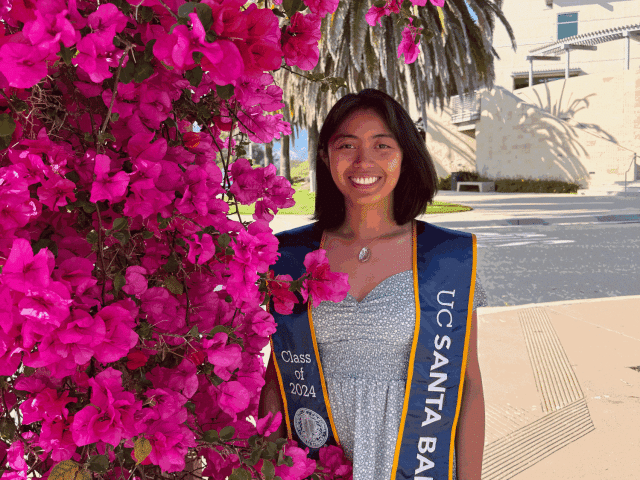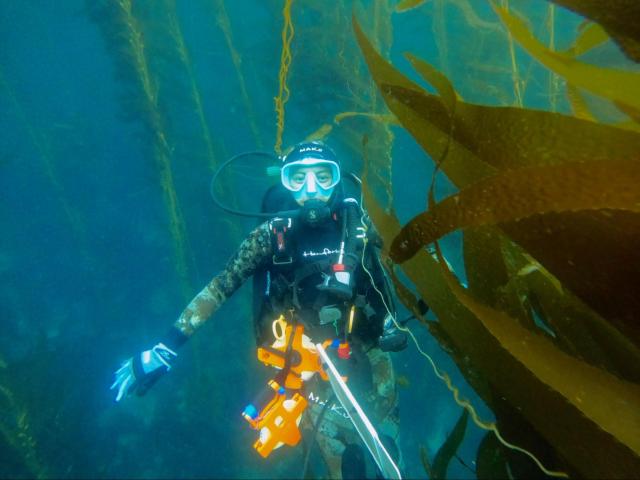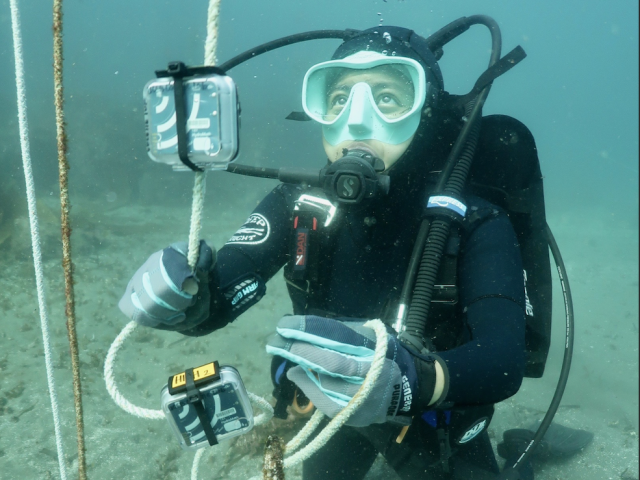A Deep Dive into Life After CCS
Geri Urgel '24 (CCS Biology) talks post-grad life & reflects on the CCS experience

As a child, Geri Urgel ‘24 (CCS Biology) often sat cross-legged on the floor, watching her tatay, a seasoned spearfisherman with hearing difficulties, scribble messages on a handheld whiteboard. Despite her grandfather’s struggles with ruptured eardrums, he shared stories of the sea—tales of fishing adventures, the ocean’s beauty, and its decline. These lessons planted the seeds of Geri’s deep commitment to marine conservation, a passion that was rooted in her grandfather’s experiences and continues to propel her work today.
She first discovered CCS through her mentor, alumna Anastasia Quintana ’14 (CCS Biology), who encouraged her to share her story with CCS Biology Faculty Armand Kuris. What began as a conversation soon became a turning point—though she didn’t know it at the time, Geri was talking to her future CCS faculty advisor. With their support, she applied to CCS, beginning an academic journey that combined her love for science with hands-on research. Now, Geri reflects on her experiences and shares advice for fellow CCS students navigating early life after graduation.

“My interest in science and the natural world has always been deeply personal as a legacy from my tatay (grandfather in Filipino).”
—Geri Urgel ‘24 (CCS Biology)
CCS: What inspired you to pursue your major in Biology with an emphasis in Marine Biology?
GU: My interest in science and the natural world has always been deeply personal, a legacy from my tatay (grandfather in Filipino). He was a spearfisherman who spent countless hours in the water, catching fish to eat and sell at the market. After years of free diving, he developed hearing difficulties due to ruptured eardrums. To communicate with him, I had to write on a whiteboard since he could not hear me, but his stories have always stayed with me.
I still remember the gut-wrenching feeling when he explained why he no longer fished. Due to declining fish stocks and competition from larger foreign commercial fishers, spearfishing became financially unsustainable. Like many of his fellow fishermen, he was forced to find other work to put food on the table.
Now, when I am in the ocean, I feel my connection with my late tatay and no longer need a whiteboard to understand my ties to the sea. Through my time with him and learning about my community’s deep relationship with the ocean, I developed a genuine curiosity about natural ecosystems and a commitment to marine science and conservation
CCS: What research or projects were you involved in during your time at CCS?
GU: During my undergraduate studies, I was involved in the Caselle Lab and the Ocean Recoveries Lab, where I worked on coral reef and kelp forest research projects. I gained hands-on experience in ecological data collection through both lab and field-based methods.
In the lab, I used a microscope to count baby corals while investigating the role of large herbivorous fish in coral reef recovery and resilience. I also performed fish dissections to extract otoliths (ear bones) to determine their ages.
In the field, I worked as a scientific diver, conducting biological surveys—including algae, fish, and invertebrate identification and sizing—along our local coastline and at the Channel Islands for the Partnership for Interdisciplinary Studies of Coastal Oceans (PISCO).
I also had the opportunity to conduct an independent research project exploring the soundscapes of kelp forests inside and outside marine protected areas at the Channel Islands. Using underwater microphones, I recorded the sounds of kelp forest ecosystems at varying levels of health.

CCS: What have you been up to since graduating from CCS?
GU: Since graduating, I have been working on my independent research project on soundscape ecology with the goal of developing a new conservation tool for kelp forest ecosystems. With a research grant I received from the Coastal Fund, I recorded soundscapes across a gradient of habitat condition, from healthy kelp forests to urchin barrens at four sites in the Northern Channel Islands, capturing diverse fish and marine mammal vocalizations. My data analysis is still ongoing, but this project has solidified my commitment to using soundscape ecology to bridge scientific research and marine conservation. I am currently applying to graduate school, so I can expand my project’s potential for real-world impact.
CCS: How do you feel your time at CCS influenced your post-graduation journey?
“Being among fellow CCS students who are involved in amazing art and science projects during undergrad was one of the reasons I was inspired to conduct my independent research project.”
—Geri Urgel ‘24 (CCS Biology)
GU: Being among fellow CCS students involved in amazing art and science projects during my undergrad years was one of the reasons I was inspired to conduct my independent research project. Learning about what CCS students were studying in the labs they were involved in and the research grants they had applied for gave me valuable insight into what I wanted to pursue for my research project after graduation.
I am also very thankful for the classes offered by Dr. Claudia Tyler, Dr. John Latto, Dr. Armand Kuris, and Dr. Anna James throughout my time at UCSB. Through their classes, I was able to envision myself in graduate school. They helped me identify my options and the steps to take in order to apply. They also brought in successful alumni who answered our questions about life after graduation.
CCS: Is there a highlight or memory that defines your CCS experience?
GU: Taking Dr. Claudia Tyler’s classes—especially Walking Biology and Physiology of Stress—as well as Dr. Anna James’ Marine Science Presentation class, were some of the highlights of my time at CCS! I also had the opportunity to attend art showcases and community events organized by the CCS community, such as the start-of-the-year welcome event and movie nights. I am very thankful for my time at CCS and wouldn’t have it any other way!
CCS: What advice would you give to soon-to-be graduating students at CCS, especially in your major?
GU: Your mental and social health is just as important as your academic success. Take the time to enjoy nature, spend time with friends and get to know the Santa Barbara community!
Geri Urgel’s transition from student to marine scientist serves as an inspiration for the next generation of graduates looking to transform their passion into research with real-world impact.